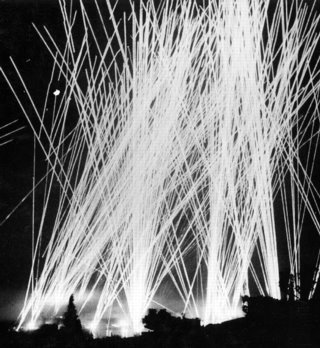As a 13 year old boy, Italian historian Tullio Marcon lived through the Allied invasion of Sicily in 1943. The Fascist creed he had been taught crumbled along with Italian resistance, especially when he met Allied soldiers and discovered they were not monsters. This is his story.
For the background to this story, see this post. Text in [square brackets] is editorial.
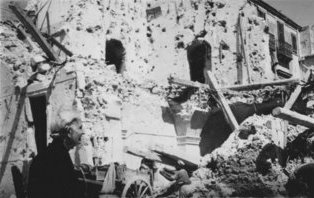
When Italy entered the war on 10 June 1940, I was living in Venice. Like all boys of my age, I was a Balilla [a boy in a compulsory junior Fascist youth organisation] who believed in my country, and in its right as a poor nation to make itself one of the rich ones, like, most of all, Great Britain. It was this that they taught us in school and in the parades on “Fascist Saturday”. And this was why I became good at identifying the RAF aircraft which bombed the nearby industrial zone. It is certainly to the RAF’s credit that it spared this city, which is unique in the world. Perhaps for this reason, when a Wellington bomber was shot down by the AA defences, its crew was given a tour of Venice in a motorboat before it took them to prison. A way of saying “thank you”?
In 1941 we moved to Taranto, the main Italian naval base. There, for over a year, we endured many bombing raids and suffered from hunger. The rationing was very strict in the city, more so than in the countryside. So we moved again in the summer of 1942 to Augusta [in south-east Sicily], where my mother was from. We hoped to find a little more bread there, even if it was closer to the war and, in particular, to [British] Malta, whose aircraft were always very active over Sicily. Augusta, being a front-line naval base, had been among its usual targets since 1940.
Nevertheless, by 1943 the strategic importance of Augusta had greatly diminished, precisely because of the intensification of the air attacks. The submarines that were based there were withdrawn to the Tyrrhenian Sea. Only the naval reconnaissance group remained, whose seaplanes suffered ever heavier losses from enemy fighters. RAF bombers conducted nuisance raids by night which damaged the people’s morale. These also wore out the AA guns, which by now had been in use for three years without spare parts. American bombers, on the other hand, operated in daylight, and every day they passed over Augusta, headed elsewhere, apparently ignoring it.
We could not know if and when it would be our turn, but we hoped to be spared. But the arrival in port of a petrol tanker, which had to unload fuel, broke the spell. On 13 May, 50 Liberator bombers came to sink it. They did not succeed, but instead inflicted dozens of casualties on the civilian population, and caused severe damage to houses. When the AA batteries saw that their barrage was ineffective because of the great height of these four-engined planes, the sense of being completely at the mercy of the enemy foreshadowed the by now imminent collapse.
Evacuation
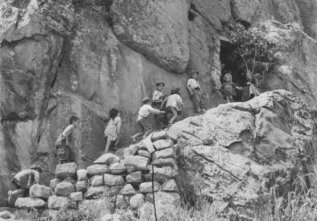
The town was now without water and light, and the streets were piled with rubble, so the remaining citizens who had not already abandoned Augusta were forced to do so. They took refuge in the surrounding countryside in the houses of parents or friends, in caves excavated from the rock, or even in the open, beneath the trees, helped by the mild weather of the approaching summer. The evacuation naturally caused many difficulties in getting food, given that the distribution points for rations were moved to places many kilometres apart, which had to be reached on foot under the hot sun. There was also the threat of being strafed, as the Malta Spitfires attacked everything that moved. Only the garrison of the Italian Navy remained in Augusta. We evacuated to a house belonging to my parents three kilometres from the town, on a hill we called “il Monte” [“the mountain”, i.e. Monte Tauro, a ridge north-east of Augusta].
In the vicinity there was an AA battery, which I visited, like all the boys, being curious about cannons and machine-guns. The AA gunners took a liking to me. These were not young men, some were unfit for normal military service, and most were recruited locally. They were enrolled in the Militia [Milmart], which in Italy was entrusted with the AA defences. It was the military arm of the Fascist party, so they wore black shirts. In the battery – numbered AS674 – they knew me as the boy who was familiar with aeroplanes. It was precisely through being a good spotter that one morning I was the first to recognize a formation of Boston bombers which appeared suddenly at a very low altitude, but which flew past, headed elsewhere. For a few weeks the Germans also deployed a battery of 88mm flak [anti-aircraft] guns nearby. The 88mm guns were much more effective than our 76mm guns. However I was not allowed near the flak battery, so I could not familiarise myself with them. In any case, even if the regime promoted friendship with “Comrade Richard”, the rapport between the allies was never warm [“Camerata Richard” was an Italian popular song praising the German soldier as ally].
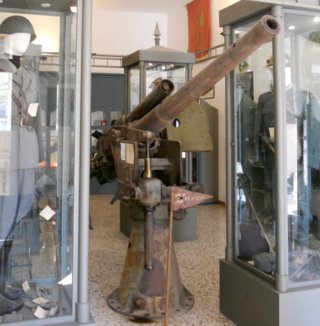
When on 11 June Pantelleria surrendered and was occupied by the Allies, those living in Sicily had no doubt that the invasion of the island was only a matter of weeks away. The island was now under siege, attacked from the sea and from the air. Any vessel which ventured out onto the water was attacked, and often sunk. One was torpedoed on 15 June by a British submarine a few miles from Augusta, in full sight of the people (myself included) who could see it from “il Monte”. There was no hour of the day or night when we did not hear air raid sirens.
The Allied air offensive became overwhelming in the first week of July, helped by almost total lack of opposition in the air, after the Italian and German fighters had been almost completely destroyed on the ground. In an attempt to shelter from the bombs, we spent the night in a neighbouring house, near which had been dug a deep shelter several metres under ground, but it was humid, infested with fleas, foul smelling and crowded. In the end I decided to trust to luck and I stayed outside. On 9 July there was an unreal calm, and since a very strong wind rose which made the sea rough, we thought – and the Armed Forces HQ in Sicily also thought – that this night the enemy would not land. But this illusion only lasted until ten in the evening.
Invasion
At that time, from Augusta, we saw and heard the flashes and roar of AA fire at Syracuse, twenty kilometres distant to the south – a diversionary bombing by Wellingtons was underway to protect the landing of the glider brigade [Operation Ladbroke]. There followed a silence fraught with uncertainty. Nobody managed to sleep. At last, at about three in the morning on the 10th, we learned that a landing in force was underway between Syracuse and Cape Passero. We were told this by a couple of officers who had also been evacuated to a nearby house, who came to say goodbye because they had been called urgently to Augusta. The word “invasion” then spread rapidly, accompanied by fear of what would happen with the arrival of the enemy, now considered inevitable. Indeed propaganda had over time convinced the civilian population that they would be submitted to many abuses, especially by negro troops, as had happened in 1941 at Benghazi according to a booklet, distributed the year before, with the eloquent title of “What the British did in Cyrenaica”.
The enemy, that is to say the British Eighth Army, arrived at Augusta two days later, at sunset on 12 July. The [SAS] men of the Special Raiding Squadron [SRS] attacked from the sea, landing in the city with its now-deserted houses. Meanwhile, the British 17 Infantry Brigade arrived from inland, after defeating the resistance of an Italian battalion and some German tanks. I have described what happened in these two days elsewhere [in his books]. I will only say that, apart from air attacks, we suffered an entire day of naval bombardment, which was an extremely stressful experience, accompanied by hunger – there being little or nothing to eat – and by lack of sleep – it being almost impossible to fall asleep.
As for me, I was curious like all the boys about the extraordinary things that were going on. Ignoring the risks, I watched out in the open, and I could see how the situation was deteriorating. It was something I would never forget. What particularly dented my Balilla creed was witnessing, on 11 July, the sabotaging of the guns so that the enemy could not use them. The gun crews then left, removing their black shirts, as it was rumoured that the British executed Fascists. It was not true, but we did not know that until afterwards. It was then that I had the feeling that this was the end of an Italy in which we had been made to believe. The trauma for my generation – which was seared by this experience – lasted a long time, and has never completely healed.
On 13 July, early in the morning, after our fourth sleepless night, having heard artillery in the distance and the sounds of vehicles close by, we decided to return for a few hours to our house. It was about 100 meters from the one with the shelter, where we had gathered on 9 July. So my mother took my hand and we went out cautiously, not knowing what we would find outside. With astonishment mixed with fear we saw what we could not have imagined – the olive grove we had to cross was full of tents and soldiers. The British were there, with their “Tommies” and their “Jocks”, and their helmets that looked like frying pans. They were intent on making the first tea of the day on some tiny stoves, or digging holes in the ground where they could lie down in the event of an air attack.
Chocolate
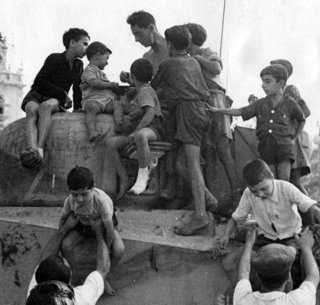
We were amazed to see that all this took place in silence, without the clamour that would be heard in an Italian or German camp. This was why we had heard nothing during the night. We went hesitantly along the path, without the soldiers paying us any attention, but then one of them approached us smiling and said “Good morning”. This was an unexpected way for an enemy to behave. My mother understood the greeting, but could not speak English, so she answered in French with a shy “Bonjour”. The soldier held out a tablet, asking me in English: “Do you like chocolate?” I looked at my mother, who held me back from taking it, fearing that it was poisoned. Then the soldier understood, and took a piece and ate it laughing, saying “Good, good”. The ice was broken. Our meeting with the “enemy” had come about in a most unexpected way, even if tinged with caution, which was reciprocal. Indeed, when the soldiers came later to ask for water to drink, which we drew up from the well, they made a sign for us to drink it before they did. They also feared that it might be poisoned.
Others also had positive experiences with the “invaders”, noting that the soldiers showed interest first in the dogs, then in the children and finally in the adults. It was reassuring to see that many of them had large rosaries around their necks, and so must be Catholics like us. They were Scots. Towards evening, after a German air attack, while we were in the house with the shelter, we saw some soldiers heading towards it. Even though it seemed there was nothing to fear, it was still too early for us to feel safe. We above all feared that they would rape a woman. Among some 40 people, the men were few and not young, many of us were only boys and there were women both old and young. After a rapid discussion among the adults, it was decided that the soldiers on the terrace would be welcomed only by older ladies, none of whom were attractive!
To this day I ask myself what these young men thought of such a welcome! But it did not last long, because we saw that they were only seeking company, they were kind, and they carried biscuits and corned beef. In fact, they were all very different from what we had feared. In this way, from that evening on, the visits became a pleasant routine, overcoming the language barrier with the universal language of gestures. The soldiers often sang songs like “Rosamunda” [“Roll Out the Barrel”], “Donkey Serenade” and also “Lili Marlene”. All of them were homesick, and often showed us photographs of mothers and wives. Naturally the young women and the girls were also by now in the group, and one soldier made eyes at them. He especially seemed to like one of them, one of my cousins called Maria, who was blonde like an English girl. Perhaps he was in love, for one day I saw that he had painted the name “Mary” on his truck!
But do not imagine that the war was over for us. The port of Augusta, full of [British] ships of every kind, attracted the attention of the Luftwaffe by day and night. Sometimes, however, the particular sound of their engines made me believe they were Italian aircraft. Then, it was a case of mixed feelings. Because they were ours, I hoped they would not be shot down, but at the same time I was afraid of ending up under their bombs. And then there were the problems of survival, first among them being food, which was scarce and lacking protein. We had forgotten the taste of butter and meat, and also sugar and pasta.
An Incident
In an attempt to improve the nutritional value of our food, especially important for growing children like me, we decided to ask the soldiers for help, but bartering, not begging. The only thing which we could exchange, having seen that it was very welcome, was wine. So one day I went to the tent in the camp where the food reserves were kept and showed the corporal in charge a bottle of wine. I got him to understand that I would give it to him in exchange for a tin of corned beef. The proposal was warmly welcomed, and the corporal told me to come again the next day with more wine. And so I did, receiving not one but two tins, because the quality was good. All this, which allowed us to taste meat again after weeks, depended however on the exchange of wine, which got scarcer and ran out after a few days. So one morning the corporal saw me with empty hands, and I made him understand that the wine was finished. He then raised a hand and showed three fingers, then four, indicating that he would give four tins for a bottle. Faced by my helplessness, eventually he was convinced and, as a gesture of sympathy, he made me a present of two tins.
Meanwhile, the area was filled with men and vehicles of all kinds, among which those little machines called Jeeps intrigued us. The mass of vehicles was incomprehensible to us. We realised that we had been at war with the whole world, seeing among the soldiers those with “Canada” or “Australia” written on their sleeves. They were united by a single badge, the crossed shield of the Eighth Army. Generally, the rapport between the soldiers and us boys was friendly, but in my case at least there was on one occasion a little incident.
I never asked any questions, but if somebody asked me if I was a Balilla I did not deny it. This little pride of mine was noticed by a soldier in the camp who, evidently, wanted to teach me a lesson. So one day as I was going along the path, he stopped me, picked up an abandoned Italian field cap, ground it under his feet and whistled the “Marseillaise”. My humiliation was such that I picked up a wooden mallet (for driving in tent pegs) and I threw it at the soldier’s legs. I knew perfectly well that I was committing a serious act, but I did so without regret. By chance, the sergeant in charge of the camp had seen it all. He called me and the soldier over, and made us stand in the middle of a clearing. Then he called all the soldiers out of the tents and made them form a semicircle around us. He began to speak, and I thought of the sorrow my mother would have for the punishment that I knew for certain would be inflicted. Instead, at the end of talking, the sergeant said something sharp to the soldier, and then shook my hand! Years later, I understood that on this occasion I had witnessed how little credence the British give to the motto: “My country, right or wrong”.
Aircraft Recognition
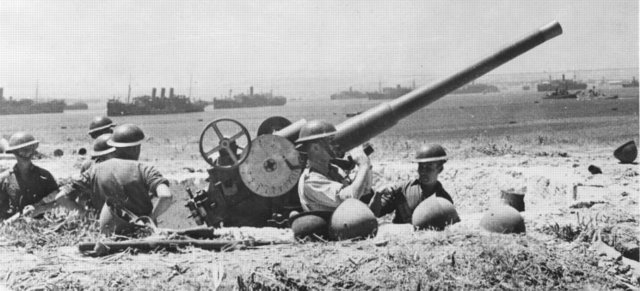
Of many things I remember that happened to me that historic summer of 1943, I pick a couple concerning my great interest in aircraft and Battery AS674, of which I have already spoken. A few days after the occupation, I again began wandering about the area. I looked with sadness at our guns, disfigured by explosions, and at the Bofors [AA guns] which the 2 Royal Scots Fusiliers had placed alongside. These Scots let us boys come close to look at the Bofors, which we did with interest, as our army did not have it. One morning when I was there, a Warhawk fighter flew low over us, and I instinctively pointed and shouted “Curtiss”. A gunner heard me, called me over and, showing me a booklet with the silhouettes of 30 aircraft, made me understand that he would give it to me if I could recognize at least ten. I accepted gladly, and the exam began. He covered the name of the plane with his finger and I, if I recognized it, gave its name, in Italian of course, and mispronouncing some a little. But that was good enough. I passed the exam with 15 marks out of 30 and the booklet was mine. I still have it, and it is one of many souvenirs of that period.
The soldiers liked me, this boy who passed the test, and who asked neither for chocolate or biscuits, but only for “aircraft recognition books” (these three words being the first English that I ever learned). So I was allowed to return to Battery AS674 to read the gunners’ magazines and books about aircraft. On one of these mornings the battery was surprised by an unexpected attack by dive bombers against a convoy which was entering port. As usual a barrage of fire rose against the attackers. Everything was firing, from 3.7 inch [heavy AA guns] to Tommy guns and you needed a lot courage to face that reaction. As usual, I did not seek shelter, and a soldier planted a helmet on my head and gave me some binoculars, pointing upwards: “Germans, Junkers 88!”. I looked and, with a pang in my heart, I saw that they were not Ju 88s, but our Re 2002s. Their desperate action was not rewarded with success, because the ships dodged their bombs.
That which I had read about so many times in the newspapers was now in front of my eyes – the Italian air force was attacking. By an irony of fate, however, we were now on the other side of the front. I prayed that our courageous men would all return to base, but years later I learned that some of them were shot down by Spitfires which were waiting for them above. When the attack ended, I tried to tell the soldiers that these were Italian aeroplanes, so they would understand that Italians were also capable of fighting bravely. But it was useless. By now the Allies thought everything that flew was German. Even the chivalrous respect of their enemy was denied to these Italian pilots.
The peaceful evening visits on the terrace by the soldiers became a regular occurrence. This was also happening in all the other houses on “il Monte”. On the evening of 25 July, they arrived saying: “Mussolini finito, kaput”. We did not have a radio, as it was forbidden to keep one, so we did not know what was happening in Rome. The soldiers were curious to see the reaction of the people to the news, and they were very surprised to see that there was not much reaction. They could not know that long since, especially in Sicily, Mussolini had lost whatever respect he had because of the war, which had turned out to be an unforgivable mistake. Further, the invasion made Italy seem far away, relegated to secondary importance, regardless of the events that happened there. But perhaps it was also hard for the British to understand how Sicilians handled the great upheavals of history.
Black Soldiers
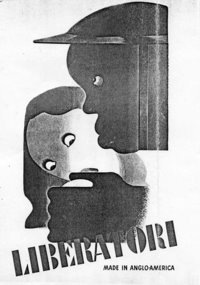
In early August, the time came for the soldiers camped nearby, including those at AS674, to leave. I remember how on the last evening, a Scotsman sat alone on an isolated rock with his bagpipes, and played one of those Highland airs that so evoke the cold and mist. But a triumphant Sicilian sunset, coloured red and violet, contrasted visibly with his music, which seemed veined with sadness. The next day the soldiers came to say goodbye to us in the manner of friends. It was an extraordinary thing, because we were in effect still enemies. But it was also an example of the human solidarity that exists away from the flags. They had understood our sufferings, and we in turn knew they returned to fight, risking death.
To make matters worse, we were told the camp would be taken over by negro soldiers of the auxiliary services. This upset the people, because they feared the violence which Italian propaganda had described. These negro troops had British officers and sergeants, and were in fact very disciplined. They had a variety of tasks: laying smoke during the nightly air raids, unloading supplies and ammunition, and distributing water from tanker trucks.
The houses on “il Monte” had cisterns that collected rain water, which was used for drinking and washing. But that summer there was such overcrowding, following a spring with poor rainfall, that reserves were minimal. So the occupation HQ ordered that each group of refugees should be given water from tanker trucks driven by negroes. When our turn came, the tanker truck pulled up in front of the house where the women were waiting with bottles, buckets and other receptacles. The driver held up a bar of soap and rubbed it between his hands, to show how to use it. The women roared with laughter, one woman saying to him in Italian (which he could not understand): “So it’s come to this, that you have to come from Africa to teach us to use soap!”
Our fears about the behaviour of the negroes soon vanished. They were gentle and you could see they were a little shy. The white men who commanded them also adopted the habit of coming to pass some hours on our terrace, as the Scots had before them. They left about 9pm. Half an hour later, some negroes also sought out our company. They came timidly onto the terrace, sat down and tried to say something that was difficult to understand. We learned they were from Kenya and Uganda, that they were Catholics. They were homesick, having left many children at home. They made it clear to us that it would be better not to tell their superiors that they visited, to avoid being reprimanded. We kept their secret, because they were good and kind.
On the subject of kindness, I remember an episode with a man called Moses and a companion whose name I do not recall. One evening, we got them to understand that the next day my mother and I would be going to Augusta, to get our house ready for our return, and so we said goodbye to them. They told us to wait a few moments, and went towards their camp. They came back a little later with two identical parcels, which they warmly begged us to accept. In each they had put a tin of meat, a packet of biscuits and some sweets, because they thought we would find nothing to eat in Augusta. If this was not disinterested kindness of spirit, I do not know what is!
Home
I have talked about returning home. It was at the beginning of September, and finally AMGOT [the Allied occupation government] authorised visits in groups, before allowing the population to finally return to their houses, despite a thousand difficulties. Up until that moment, access to Augusta was prohibited, because of the air raids, but also because the management of the naval base was easier without the population present.
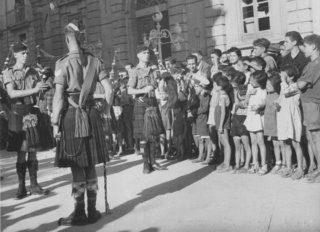
When permission was given to return for three hours only, my mother and I went – on foot, naturally – towards Augusta, meeting more and more people along the way. There was a brief low-level air attack which caused everybody to scatter under the trees, then we resumed our march. At one point, we encountered a band of the 6 Seaforth Highlanders, and were amazed to see the musicians wearing kilts. I remember that the bass drummer was a giant some six and a half feet tall, wearing a leopard skin. Shortly before this, while we were in the column of people on the road, an MP on a motorcycle stopped suddenly in front of my mother and me, exclaiming threateningly: “You’re Germans!” The misunderstanding arose because we were both blonde-haired in a crowd of black-haired people. Finally, he was convinced and allowed us to proceed.
In town, the engineers had removed the rubble, but we had to walk on a carpet of shell splinters and unexploded ammunition. Many houses were hit after 13 May, and others were occupied by the troops of the British garrison. With our hearts in our mouths we picked our way towards our home, which was on the first floor of an apartment block. We saw it from afar – the building was still standing. We climbed the stairs anxously, afraid we would find the house occupied. It was empty. But after the initial relief passed, we discovered it was missing the camp beds, a table, chairs and other things, which certainly – as we had seen – had been used by the soldiers to make their camps more comfortable. It was war. Many drawers of the wardrobes were open, but not much was missing.
One thing that was missing was my Balilla uniform: the black shirt, the shorts, the grey-green knee socks, the blue neckerchief, the black fez and the badges bearing the profile of Il Duce [Mussolini]. I’m sure some soldier took my uniform as a souvenir. And I still wonder if by chance it survives to this day in some corner of Britain!
Links:
The story of this story.
Read a story about the batteries of Augusta here.
The picture of the 76/40 gun above was taken in the Military Museum at Chiaramonte Gulfi

